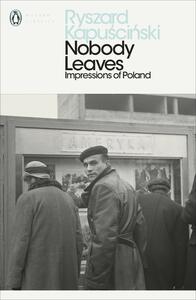Take a photo of a barcode or cover
informative
sad
slow-paced
I picked up this short collection of essays while visiting family in Poland, hoping to catch a glimpse of the country my parents grew up in. The author, a journalist, captures a particular era with his observations, but the essays often feel like rambling lists, lacking context and coherence. The short, jagged sentence structure leans more toward the lyrical than the clear. Often, midway through an essay, I found myself wondering what the point was. Kapuściński inserts himself into the places and stories he describes, yet maintains a distance that left me questioning why these moments were deemed worth writing about. Though this collection has received praise, I found it challenging to connect to that time and place as I had hoped.
challenging
emotional
hopeful
informative
inspiring
reflective
sad
medium-paced
funny
lighthearted
medium-paced
This book was really good fun! Not much to say about it to be fair other than that everyone should read it!
It’s super short, super simple, it’s to the point and I love the style. I feel like it’s a pretty faithful translation. Even with my tiny knowledge of Polish it just mirrors the rhythm of the language super well.
Some of the lines in this book are just gorgeous and there are stories in here that have kept me thinking all day.
I want to read more of what Kapuściński has written, and I plan on revisiting this book again in the meantime and annotating it. There’s just so much to be found in this book about Poland, people, and the art of writing.
informative
sad
slow-paced
challenging
emotional
reflective
sad
medium-paced
Kapuściński lives up to his hype as Polands most well regarded journalist. Whereas Western journalism is so deterministic, he has a way of writing that arcs around the indents people leave behind, the impression of the way things move and feel. I love that this selection focuses on Polish life, although I will say that sometimes I feel he is missing context on certain aspects of peasant Polish life. They are still masterful, even more so for how true and realistic they are while contending against Soviet censorship. An icon ❤️
reflective
sad
slow-paced
Kapuściński tenía siete años cuando descubrió la guerra. Era 1939 y deambulaba en un prado cerca de su casa cuando reparó en esos destellos que surcaban el cielo, seguidos de un sonido ensordecedor. El entonces pequeño Rysiek –como le llamaban los amigos, una versión polaca de ‘Ricardito’– no entendía lo que sucedía. Un estruendo desmesurado e inexplicable lo alertaba. Rysiek nunca había escuchado una bomba, ni siquiera estaba al tanto de su existencia. Contempló azorado cómo, desde el bosque, se levantaba la tierra. Nunca había visto algo semejante, una magia siniestra que lo atraía como a todo niño frente a lo incierto. Cuando se encaminaba hacia esa dirección, alguien lo cogió del hombro, tumbándolo al suelo. Era su madre. “No te muevas —susurró—. Ahí está la muerte”. Así lo contó en su primer libro de reportajes literarios, LA JUNGLA POLACA. Un libro clave en la obra periodística y narrativa del más conocido reportero polaco, considerado para muchos como "el periodista del siglo XX". Me gustó mucho este libro, no solamente porque vivo en Polonia y disfruté reconocer o aprender muchos lugares, personajes y referencias históricas, sino porque aquí se puede conocer a ese primer Kapu, muy curioso y decidido a contar historias. Un periodista muy joven, comprometido políticamente y con una visión muy humana y cuestionadora del mundo. No es su mejor libro, para nada, pero es muy interesante y quizá uno de los más personales.
reflective
sad
medium-paced
70% noioso, si riscatta nell'ultimo 30%. Non mi lascia una grande immagine della Polonia e ritengo che molti episodi potrebbero adattarsi a qualsiasi paese di campagna dell'Europa del secondo dopoguerra.
reflective
slow-paced
Some of the most beautiful writing I’ve ever encountered and it just made me sad I couldn’t read it in the original polish because I’m sure it’s even nicer
Minor: Death, War




